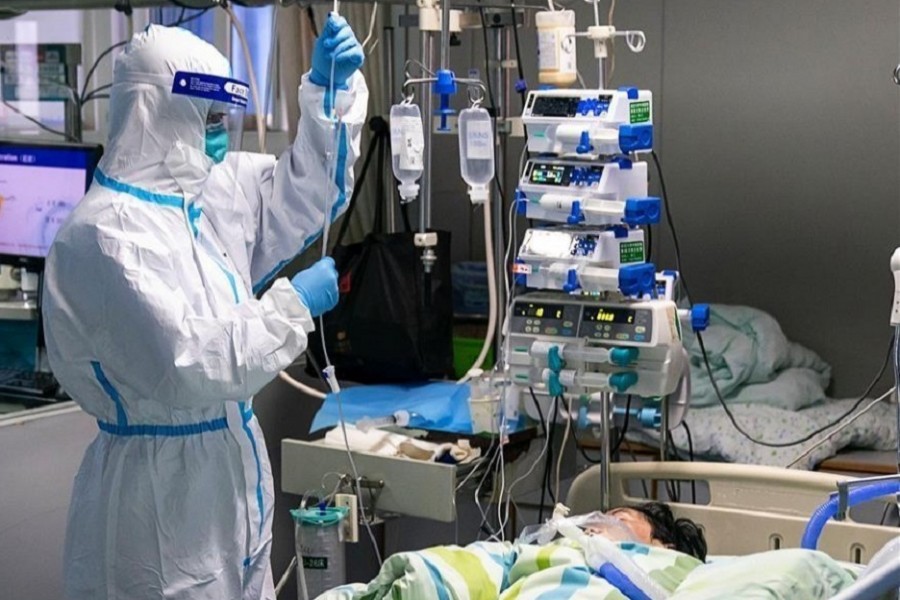The lambda variant of the novel coronavirus, first identified in Peru, has been found in Japan for the first time, health ministry officials said Friday, reports The Japan Times citing Bloomberg.
The variant was detected in a woman in her 30s at Haneda Airport who arrived from Peru on July 20, according to the ministry.
She tested positive for the coronavirus in a quarantine check at the airport, with no symptoms.
The virus was confirmed to be of the lambda variant in an analysis by the National Institute of Infectious Diseases.
According to the institute, the lambda variant was first detected in Peru in August last year and has been spreading in South America.
Compared with the conventional strain, the variant may be more infectious and have stronger resistance to vaccines, but its details are not known, the institute said.
Meanwhile, the Delta variant is challenging the part of the world that’s been most successful in blunting the economic impact of COVID-19, with Asian countries that snuffed it out locking down again as the virus returns.
Just 12 months ago, the Asia-Pacific region’s rapid containment of COVID-19 made them the envy of the world as the virus ravaged the U.S. and Europe. Now, from Seoul to Sydney, Bangkok to Beijing, authorities are reimposing growth-sapping restrictions as low vaccination rates in many of those places leave their populations vulnerable.
Thailand is bracing for the emergence of new COVID-19 clusters as the highly infectious delta variant rips through more regions outside of its current epicentre of Bangkok metropolitan region.
About 60 per cent of Thailand’s new coronavirus cases in recent days have been reported from outside the capital region, with low vaccination rates and looser movement curbs, official data showed. The country’s rate of new infections per million population at nearly 300 now dwarfs that of Indonesia or India, with a new daily record 21,379 cases reported on Friday.
Unlike the U.S. where anti-vaccine fringe groups have fueled resistance to COVID-19 shots, Hong Kong is facing a different challenge. Most of the city’s elderly are reluctant to get inoculated, and some point to an unlikely source for the hesitancy: their doctors.
The number of patients hospitalized with serious cases of COVID-19 in Japan rose to 1,020 as of Thursday, the highest since June, according to data from the nation’s health ministry.
Singapore has increased the number of hotels that can be used to quarantine people as the city-state seeks to control the spread of the virus amid the recent wave of infections.
More than 90 hotels are currently used to accommodate people coming into the country and those who have been in contact with COVID-19 cases, an increase from more than 70 as of May this year, a spokesperson for the Ministry of National Development said in a response to queries from Bloomberg News. Singapore’s daily virus infections in the community hit a record late last month and cases exceeded 100 for two weeks before recently ebbing.
Malaysia’s government is focusing on speeding up its vaccination drive after daily cases topped a record 20,000 for the first time on Thursday. The surge in new COVID-19 infections is due to the fast-spreading delta variant, which has swept across the globe.
Sydney’s daily delta outbreak caseload has risen to another record, with 291 new infections detected and authorities warning the situation in Australia’s largest city could worsen.
The city has failed to bend the curve of new infections lower despite being in lockdown for almost six weeks. The new cases surpass the previous record number of new infections of 262 on Thursday; one more person died.
Thailand reported 21,379 new COVID-19 infections, a daily record that took the nation’s total past 700,000, as recent tightening of containment measures has failed to quell a raging outbreak. The Southeast Asian nation also reported a single-day record of 191 deaths, official data showed Friday.
Singapore’s locally transmitted virus cases stayed below 100 for a third day, ahead of a planned government review of strict social distancing restrictions that have banned dining in and limited gatherings to just two people.
Finance Minister Lawrence Wong said Thursday the government will give an update of the COVID-19 situation soon. Singaporean authorities had planned in early August to review measures that were reimposed after an outbreak at a fishery port in mid-July had spread to other locations, including karaoke bars and hospitals to a casino and worker dorms.
Singapore is also easing regulations on visitors from Taiwan as conditions have improved, the health ministry said in a separate statement. Those who’ve spent the last 21 days in Taiwan can enter without a 14-day stay-home notice requirement so long as they test negative on arrival.
The Philippines included more cities and provinces under lockdown, adding to the capital region which returned to the strictest form of movement curbs on Friday. Laguna, Iloilo City and Cagayan De Oro were placed under enhanced community quarantine, President Rodrigo Duterte’s spokesman said late Thursday.
The Philippines has tightened borders and set up checkpoints between cities in the capital region. Only authorised workers can cross, and those buying essential goods can do so only within their cities, the nation’s police chief said. The government told the public not to believe social media posts claiming that the unvaccinated won’t receive aid during the lockdown as crowds formed in vaccination sites, risking the spread of the virus.
South Korea will extend current level 4 social distancing rules in the Greater Seoul area and level 3 rules in other areas for another two weeks, Yonhap News reported.
Under the highest level of social distancing in the Greater Seoul area, private gatherings of three or more people are banned after 6 p.m.


